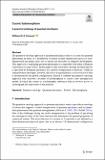Files in this item
Cosmic hylomorphism : a powerist ontology of quantum mechanics
Item metadata
| dc.contributor.author | Simpson, William | |
| dc.date.accessioned | 2021-04-22T15:30:07Z | |
| dc.date.available | 2021-04-22T15:30:07Z | |
| dc.date.issued | 2021-01-15 | |
| dc.identifier | 272864247 | |
| dc.identifier | 1173f48b-bff3-4cdf-9d22-2e7db6b645c0 | |
| dc.identifier | 85099418624 | |
| dc.identifier.citation | Simpson , W 2021 , ' Cosmic hylomorphism : a powerist ontology of quantum mechanics ' , European Journal for Philosophy of Science , vol. 11 , 28 . https://doi.org/10.1007/s13194-020-00342-5 | en |
| dc.identifier.issn | 1879-4920 | |
| dc.identifier.uri | https://hdl.handle.net/10023/23081 | |
| dc.description | Funding: Templeton, God and the Book of Nature, Grant Id: 61507. | en |
| dc.description.abstract | The primitive ontology approach to quantum mechanics seeks to account for quantum phenomena in terms of a distribution of matter in three-dimensional space (or four-dimensional spacetime) and a law of nature that describes its temporal development. This approach to explaining quantum phenomena is compatible with either a Humean or powerist account of laws. In this paper, I offer a powerist ontology in which the law is specified by Bohmian mechanics for a global configuration of particles. Unlike in other powerist ontologies, however, this law is not grounded in a structural power that is instantiated by the global configuration. Instead, I combine the primitive ontology approach with Aristotle’s doctrine of hylomorphism to create a new metaphysical model, in which the cosmos is a hylomorphic substance with an intrinsic power to choreograph the trajectories of the particles. | |
| dc.format.extent | 25 | |
| dc.format.extent | 446963 | |
| dc.language.iso | eng | |
| dc.relation.ispartof | European Journal for Philosophy of Science | en |
| dc.subject | Primitive ontology | en |
| dc.subject | Quantum mechanics | en |
| dc.subject | Powers | en |
| dc.subject | Hylomorphism | en |
| dc.subject | BD Speculative Philosophy | en |
| dc.subject | T-NDAS | en |
| dc.subject | NIS | en |
| dc.subject | MCC | en |
| dc.subject.lcc | BD | en |
| dc.title | Cosmic hylomorphism : a powerist ontology of quantum mechanics | en |
| dc.type | Journal article | en |
| dc.contributor.institution | University of St Andrews. School of Divinity | en |
| dc.identifier.doi | https://doi.org/10.1007/s13194-020-00342-5 | |
| dc.description.status | Peer reviewed | en |
This item appears in the following Collection(s)
Items in the St Andrews Research Repository are protected by copyright, with all rights reserved, unless otherwise indicated.

